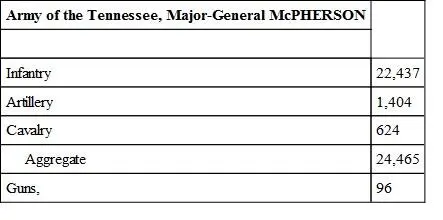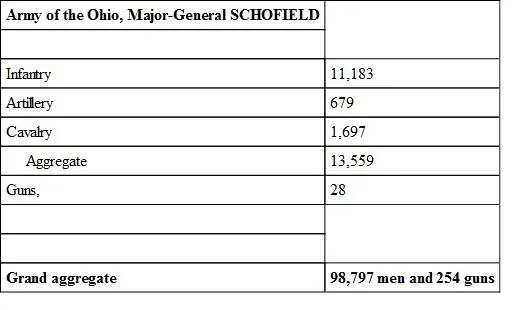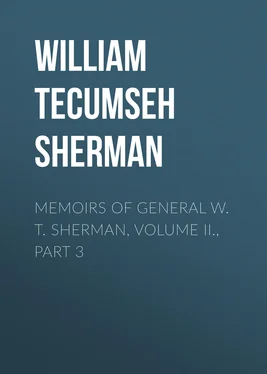William Tecumseh Sherman - Memoirs of General W. T. Sherman, Volume II., Part 3
Здесь есть возможность читать онлайн «William Tecumseh Sherman - Memoirs of General W. T. Sherman, Volume II., Part 3» — ознакомительный отрывок электронной книги совершенно бесплатно, а после прочтения отрывка купить полную версию. В некоторых случаях можно слушать аудио, скачать через торрент в формате fb2 и присутствует краткое содержание. Жанр: Биографии и Мемуары, История, foreign_edu, foreign_antique, foreign_prose, на английском языке. Описание произведения, (предисловие) а так же отзывы посетителей доступны на портале библиотеки ЛибКат.
- Название:Memoirs of General W. T. Sherman, Volume II., Part 3
- Автор:
- Жанр:
- Год:неизвестен
- ISBN:нет данных
- Рейтинг книги:3 / 5. Голосов: 1
-
Избранное:Добавить в избранное
- Отзывы:
-
Ваша оценка:
- 60
- 1
- 2
- 3
- 4
- 5
Memoirs of General W. T. Sherman, Volume II., Part 3: краткое содержание, описание и аннотация
Предлагаем к чтению аннотацию, описание, краткое содержание или предисловие (зависит от того, что написал сам автор книги «Memoirs of General W. T. Sherman, Volume II., Part 3»). Если вы не нашли необходимую информацию о книге — напишите в комментариях, мы постараемся отыскать её.
Memoirs of General W. T. Sherman, Volume II., Part 3 — читать онлайн ознакомительный отрывок
Ниже представлен текст книги, разбитый по страницам. Система сохранения места последней прочитанной страницы, позволяет с удобством читать онлайн бесплатно книгу «Memoirs of General W. T. Sherman, Volume II., Part 3», без необходимости каждый раз заново искать на чём Вы остановились. Поставьте закладку, и сможете в любой момент перейти на страницу, на которой закончили чтение.
Интервал:
Закладка:
Subsequently were added to my staff, and accompanied me in the field, Brigadier-General W. F. Barry, chief of artillery; Colonel O. M. Poe, chief of engineers; Colonel L. C. Easton, chief quartermaster; Colonel Amos Beckwith, chief commissary; Captain Thos. G. Baylor, chief of ordnance; Surgeon E. D. Kittoe, medical director; Brigadier-General J. M. Corse, inspector-general; Lieutenant-Colonel C. Ewing, inspector-general; and Lieutenant-Colonel Willard Warner, inspector-general.
These officers constituted my staff proper at the beginning of the campaign, which remained substantially the same till the close of the war, with very few exceptions; viz.: Surgeon John Moore, United States Army, relieved Surgeon Kittoe of the volunteers (about Atlanta) as medical director; Major Henry Hitchcock joined as judge-advocate, and Captain G. Ward Nichols reported as an extra aide-de-camp (after the fall of Atlanta) at Gaylesville, just before we started for Savannah.
During the whole month of April the preparations for active war were going on with extreme vigor, and my letter-book shows an active correspondence with Generals Grant, Halleck, Thomas, McPherson, and Schofield on thousands of matters of detail and arrangement, most of which are embraced in my testimony before the Committee on the Conduct of the War, vol. i., Appendix.
When the time for action approached, viz., May 1,1864, the actual armies prepared to move into Georgia resulted as follows, present for battle:



These figures do not embrace the cavalry divisions which were still incomplete, viz., of General Stoneman, at Lexington, Kentucky, and of General Garrard, at Columbia, Tennessee, who were then rapidly collecting horses, and joined us in the early stage of the campaign. General Stoneman, having a division of about four thousand men and horses, was attached to Schofield's Army of the Ohio. General Garrard's division, of about four thousand five hundred men and horses, was attached to General Thomas's command; and he had another irregular division of cavalry, commanded by Brigadier-General E. McCook. There was also a small brigade of cavalry, belonging to the Army of the Cumberland, attached temporarily to the Army of the Tennessee, which was commanded by Brigadier-General Judson Kilpatrick. These cavalry commands changed constantly in strength and numbers, and were generally used on the extreme flanks, or for some special detached service, as will be herein-after related. The Army of the Tennessee was still short by the two divisions detached with General Banks, up Red River, and two other divisions on furlough in Illinois, Indiana, and Ohio, but which were rendezvousing at Cairo, under Generals Leggett and Crocker, to form a part of the Seventeenth Corps, which corps was to be commanded by Major-General Frank P. Blair, then a member of Congress, in Washington. On the 2d of April I notified him by letter that I wanted him to join and to command these two divisions, which ought to be ready by the 1st of May. General Blair, with these two divisions, constituting the Seventeenth Army Corps, did not actually overtake us until we reached Acworth and Big Shanty, in Georgia, about the 9th of June, 1864.
In my letter of April 4th to General John A. Rawains, chief of staff to General Grant at Washington, I described at length all the preparations that were in progress for the active campaign thus contemplated, and therein estimated Schofield at twelve thousand, Thomas at forty-five thousand, and McPherson at thirty thousand. At first I intended to open the campaign about May 1st, by moving Schofield on Dalton from Cleveland, Thomas on the same objective from Chattanooga, and McPherson on Rome and Kingston from Gunter's Landing. My intention was merely to threaten Dalton in front, and to direct McPherson to act vigorously against the railroad below Resaca, far to the rear of the enemy. But by reason of his being short of his estimated strength by the four divisions before referred to, and thus being reduced to about twenty-four thousand men, I did not feel justified in placing him so far away from the support of the main body of the army, and therefore subsequently changed the plan of campaign, so far as to bring that army up to Chattanooga, and to direct it thence through Ship's Gap against the railroad to Johnston's rear, at or near Resaca, distant from Dalton only eighteen miles, and in full communication with the other armies by roads behind Rocky face Ridge, of about the same length.
On the 10th of April I received General Grant's letter of April 4th from Washington, which formed the basis of all the campaigns of the year 1864, and subsequently received another of April 19th, written from Culpepper, Virginia, both of which are now in my possession, in his own handwriting, and are here given entire. These letters embrace substantially all the orders he ever made on this particular subject, and these, it will be seen, devolved on me the details both as to the plan and execution of the campaign by the armies under my immediate command. These armies were to be directed against the rebel army commanded by General Joseph E. Johnston, then lying on the defensive, strongly intrenched at Dalton, Georgia; and I was required to follow it up closely and persistently, so that in no event could any part be detached to assist General Lee in Virginia; General Grant undertaking in like manner to keep Lee so busy that he could not respond to any calls of help by Johnston. Neither Atlanta, nor Augusta, nor Savannah, was the objective, but the "army of Jos. Johnston," go where it might.
[PRIVATE AND CONFIDENTIAL.]
HEADQUARTERS ARMIES OF THE UNITED STATES WASHINGTON D. C., April 4, 1864.
Major-General W. T. SHERMAN, commanding Military Division of the Mississippi.
GENERAL: It is my design, if the enemy keep quiet and allow me to take the initiative in the spring campaign, to work all parts of the army together, and somewhat toward a common centre. For your information I now write you my programme, as at present determined upon.
I have sent orders to Banks, by private messenger, to finish up his present expedition against Shreveport with all dispatch; to turn over the defense of Red River to General Steels and the navy, and to return your troops to you, and his own to New Orleans; to abandon all of Texas, except the Rio Grande, and to hold that with not to exceed four thousand men; to reduce the number of troops on the Mississippi to the lowest number necessary to hold it, and to collect from his command not less than twenty-five thousand men. To this I will add five thousand from Missouri. With this force he is to commence operations against Mobile as soon as he can. It will be impossible for him to commence too early.
Gillmore joins Butler with ten thousand men, and the two operate against Richmond from the south aide of James River. This will give Butler thirty-three thousand men to operate with, W. F. Smith commanding the right wing of his forces, and Gillmore the left wing. I will stay with the Army of the Potomac, increased by Burnside's corps of not less than twenty-five thousand effective men, and operate directly against Lee's army, wherever it may be found.
Sigel collects all his available force in two columns, one, under Ord and Averill, to start from Beverly, Virginia, and the other, under Crook, to start from Charleston, on the Kanawha, to move against the Virginia & Tennessee Railroad.
Читать дальшеИнтервал:
Закладка:
Похожие книги на «Memoirs of General W. T. Sherman, Volume II., Part 3»
Представляем Вашему вниманию похожие книги на «Memoirs of General W. T. Sherman, Volume II., Part 3» списком для выбора. Мы отобрали схожую по названию и смыслу литературу в надежде предоставить читателям больше вариантов отыскать новые, интересные, ещё непрочитанные произведения.
Обсуждение, отзывы о книге «Memoirs of General W. T. Sherman, Volume II., Part 3» и просто собственные мнения читателей. Оставьте ваши комментарии, напишите, что Вы думаете о произведении, его смысле или главных героях. Укажите что конкретно понравилось, а что нет, и почему Вы так считаете.












